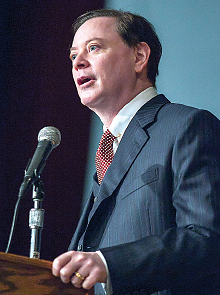Parents—and Others—Learn to Accept Very Different Children
Abstract
Parents may need to invest a lot of work to ultimately value children who are very different from themselves, says a well-known author and lecturer in psychiatry.
All children are different from their parents, but some children are more different than others, as Andrew Solomon, Ph.D., found out in researching his book Far From the Tree: Parents, Children, and the Search for Identity.

“We care for our children because we love them, and we love them because we care for them, said Andrew Solomon, Ph.D., at APA’s annual meeting in New York.
For many parents, that difference can take some getting used to, said Solomon, a writer and a lecturer in psychiatry at Weill Cornell Medical College, at APA’s 2014 annual meeting in New York in May.
“I believe that most people love their children, but acceptance may not happen in the cradle,” he said. “It takes time, and it can be difficult.”
That understanding arose from Solomon’s insight that people have two identities. One was “vertical,” defined by characteristics descending from one’s predecessors: race, nationality, culture, language, and others. The second is “horizontal,” those forms of identity not shared with one’s parents, but tied to others with similar characteristics, like being deaf or a dwarf or autistic or mentally ill or a prodigy, he explained.
His own parents always loved him, he said, but it was a struggle for them to accept him as a gay man. That is not exceptional, he found. Many parents, not to mention society in general, often see these children as abnormal beings in need of “fixing.”
In an age of medical progress, for instance, cochlear implants can be seen as a cure for deafness. Yet one deaf person Solomon interviewed sounded wistful at the thought that the day would come when there would no longer be people like him.
“What does it mean when we set out to eliminate a whole category of humanity?” Solomon asked. “This is what we hear when you mourn for our existence and pray for a cure.”
Parental response to children who are “different” may evolve over years or decades, running from anger at their apparent ill fortune to bewilderment to acceptance and, with luck, to celebration, he said. “But nothing is a linear process.”
All parenting involves changing a child through education, instilling moral values and manners. “But you have to figure out which things are you going to fix and which are you going to celebrate.”
Historically, when “normal” families had one of these “abnormal” children, the result was often deep guilt and shame.
That parents today are not blamed is liberating. The emergence of children and parents willing to talk has created a sea change in perceptions, at least for some. The parents of children with autism, for instance, organized and politicized their cause and forced changes onto government, society, and medicine, he noted.
Solomon also praised mainstreaming programs that brought disabled and other children with different identities into regular classrooms, even if they added some extra burden to the educational process.
“It’s the nondisabled children who benefit most, because the lessons in humanity they learn stand them in better stead than finishing long division two weeks earlier,” he said.
Ultimately, a scary (if temporary) misdiagnosis of his son in the hospital just after the child was born brought his work on the book into sharp personal focus, he told an overflow annual meeting audience.
“I used to think [prior to starting my research] that these parents were some kind of fools, inflating themselves on a lifetime journey with these thankless children and trying to breed identity out of misery,” he said. “But I had encountered so much strange love that my research had built me a plank, and I was ready to join them on their ship.” ■
A Psychiatric News video interview with Solomon, can be accessed here.



